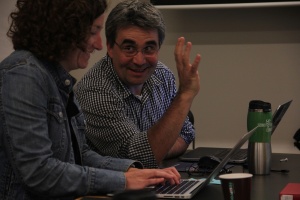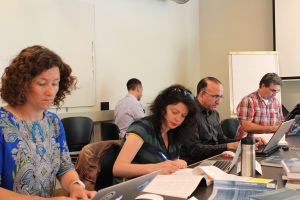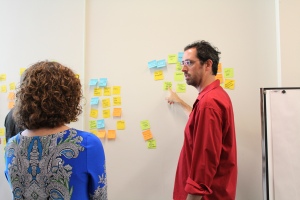Report on BC OER Book Sprint
http://oerresearchhub.org/2014/07/02/clint-lalonde-bccampus-reflections-on-an-open-textbook-sprint/comment-page-1/
Clint Lalonde (BCcampus): Reflections on an Op:
en Textbook Sprint
We’re excited to work with all our collaborators and, as you may have picked up in previous posts. we’ve just started to work with BCcampus in British Columbia, Canada. More specifically, we are working with BCcampus Open Textbook Project, an initiative that is producing forty open textbooks for use by educators and students in British Columbia. The project is currently creating open textbooks in the “most highly enrolled subject areas” in the province, having previously identified OER/open textbook material that can be reused and incorporated into the planned textbooks.
During June 2014, educators came together to collectively author a Geography open textbook over a period of four days! Manager of Open Education, Clint Lalonde, kindly agreed to tell us more about the sprint. Read on for more on the project, why they chose to adopt the sprint method, how they made it a success and why they chose Geography as the focus….
Extra special thanks to Clint for taking time out to write the following post. Thanks to Adam Hyde at Booksprints for his advice re: licensing for the image below.
Clint Lalonde (right) with Amanda Coolidge (Photo Credit: CC-BY Adam Hyde, Booksprints http://tinyurl.com/lnom3h4)
“On June 9th, 2014 a group of educators and technologists gathered at the University of British Columbia with a unique challenge; create a first year university level Geography open textbook in just four days.
The collaborative authoring model is known as a book sprint. Inspired by code sprints from the software development world, the goal of a book sprint is to create a book from scratch in a very short time frame.
We began thinking about an open textbook sprint late last fall after being inspired by a number of similar projects like the events carried out by Siyavula in South Africa, and the Creative Commons supported textbook hackathon at the University of Otago in New Zealand which produced a first year media studies textbook. Our first task was to contact these groups to find out how they did it. Along the way, we discovered Adam Hyde and his company, BookSprints who offered facilitation services for events like the one we were planning., A couple of Skype calls with Adam convinced me that having an exteranl facilitator to keep everyone on task was the way to go, and that Adam’s group were the right people to facilitate our event.
Once we had a facilitator in place, we needed to find the people to create the textbook. We issued a province wide call looking for post-secondary Geography faculty who might want to participate. The first to sign on was Arthur Green of Okanagan College, followed by Britta Ricker (Simon Fraser University), Siobhan McPhee (University of British Columbia), Aviv Ettya (University of the Fraser Valley), and Cristina Temenos (Simon Fraser University). Other key participants in the sprint were librarian Jon Strang, instructional designer (and Manager of Open Education at BCcampus) Amanda Coolidge, programmer Brad Payne and illustrator Hilda Anggraeni. It was this group of people, facilitated by BookSprints Barbara Ruehling, who gathered at UBC and created the book.
So, why did we choose to write this particular open textbook using this particular method? A number of reasons. First, the sprint method has a set deadline with a set outcome. The combination of strict deadline with a concreate outcome at the end of that deadline provided momentum to keep the project moving forward over the four days. All the participants cleared their schedule for the full four days and committed to working on this one project for the entire time. We stayed on site together, had our meals delivered to the writing centre where we worked, and cocconed ourselves from the outside world for the full four days. It is amazing what you can achieve when you have the ability to concentrate on a single project for a sustained period of time. As short as four days may sound, it is actually quite a luxury in this day and age to be able to have such a long period of time to dedicate to a single project without life and work distractions sidetracking you.
Second, the sprint offers a great opportunity to begin developing a community around the textbook. Sustainability is always an issue with the development of open educational reosources; how will these resources be maintained in the future? One of the sustainability models that we think has the most potential is a model of community stewardship where a group of educators who use the book take ownership of the book. The intense nature of the sprint provides a great opportunity to begin to develop this community by bringing together a group of faculty from across institutions interested in not only creating, but also adopting what they create. Moving forward, we hope this group of authors will form the nucleaus of the community that can steward this textbook.
BCcampus open textbook sprint participants (Photo Credit: BCcampus_News CC-BY SA 2.0http://tinyurl.com/mank4kf)
Finally, why did we choose geography as our subject? The scope of the BC Open textbook Project is to provide free and open textbooks for the top 40 post-secondary subject areas in our province. One of the strategies we have with our project is to reuse existing open textbooks from other projects, such asOpenStax College, wherever possible. We don’t want to recreate good work that has been done by others and openly licensed for reuse. By adopting a “reuse first” strategy we have been able to create a curated library of over 50 open textbooks matching 36 of our subject areas.
One of the gaps in the collection was Geography. We simply could not find a suitable open textbook to fill that first year Geography requirement. Geography is a discipline that is regionally focused, so it was not a surprise that we could not find a complete textbook covering Geography in the commons as there simply has not been anyone creating open textbooks focused on our region. We saw the opporunity with the BC Open textbook project to create something that was so regionally specific that it was unlikely to be created by any other open textbook project.
As for the book itself, it was completely planned out on the first morning of the sprint by the participants. This is vitally important to the success of a book sprint. The people in the room create the book together. This creates a sense of shared ownership and helps to keep the participoants motivated to work 12-14 hour days as they become personally invested in creating something that they define. The end result in our case is 48,420 words across eight chapters which incorprates numerous custom illustrations, interactive maps, elements of open pedagogy and suggested service learning activities. The book also contains numerous contemporary case studies specific to the province of British Columbia, and bridges the various different sub-disciplines of Geography.
Currently, the book is being copy edited and will be released with a CC-BY license in August. It will be available for download from open.bccampus.ca.
See photos of the 4 day sprint on the BCcampus and BookSprint Flickr accounts. We also tweeted about it using the #bcbooksprint hashtag, and live blogged the four days at open.bccampus.ca/tag/booksprint.”
“Day One” (Photo Credit: BCcampus_News CC-BY-SA 2.0 http://tinyurl.com/k8ztb5n)



